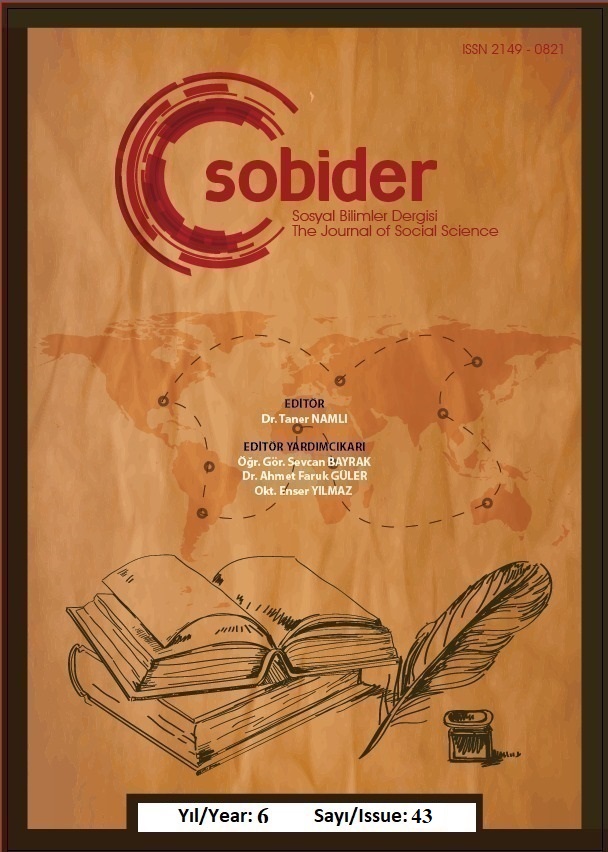Author :
Abstract
1990’lı yılların başlarında kürelleşmenin bir sonucu olarak uluslararası finansal ve sermaye hareketleri artmış, gelişmiş ülkelerden gelişmekte olan ülkelere doğru yoğun bir sermaye akışı gerçekleşmiştir. Bu durum tasarrufların ve yatırımların uluslararası piyasalarda etkin bir şekilde tahsis edilmesini imkan vermiştir. Bu sermaye hareketleri ülkelerdeki yatırımları artırarak büyümeyi olumlu bir şekilde etkileyebilmekteyken; aynı zamanda finansal istikrarsızlığa yol açabilme ihtimali de söz konusu olabilmektedir. Bu sebeple yatırımlarla tasarrufların eşit olmaması ülkeler için problem oluşturabilmektedir. Bu çalışmada nipeten daha düşük tasarruf oranına sahip E7 ülkelerinde tasarruf-yatırım ilişkisi analiz edilmektedir. 1980-2018 yıllık verileriyle yeni nesil panel ekonometrik testler yapılmıştır. Elde edilen sonuçlara göre Feldstein-Horioka hipotezinin geçerli olduğu, yatırımların, uluslararası finansal piyasalar tarafından nispeten düşük düzeyde finanse edildiği şeklindedir.
Keywords
Abstract
As a result of globalization, in the beginning of 1990s; international financial and capital movements have increased and an intense flow of capitalizm took place from developed countries to on going developing countries. The integration of financial markets allows efficient allocation of savings and investments worldwide. While these capital movements can increase the investments in the countries, they can affect the growth positively; it may also lead to financial instability. Therefore, the fact that investments and savings are not equal can create problems for countries. In this study, the savings-investment relationship in the E7 countries, which has a relatively lower saving rate, is analyzed. A new generation of panel econometric tests have been conducted with the 1980-2018 annual data. According to the results, the Feldstein-Horioka hypothesis is valid and the investments are financed at a relatively low level by the international financial markets.
Keywords
- Blanchard, O., and Giavazzi, F. (2002). “Current Account Deficits in The Euro Area: The End of the Feldstein_Horioka Puzzle?”. Brookings Papers on Economic Activity, 2, 147209.
- Bolatoğlu, N., (2005). “Türkiye'de Yurtiçi Yatırım ve Yurtiçi Tasarruf Oranları Arasındaki İlişki”. Ekonomik Yaklaşım, 16(56). 19-32.
- Breuscht, T. and Pagan, A. (1980). “The Lagrange Multiplier Test and its Applications to Model Specification in Econometrics”, The Review of Economic Studies, 47(1): 239-253.
- Büberkökü, Ö. (2016), “Uluslararasi Sermaye Hareketliliğinin İncelenmesi: Yükselen Piyasa Ekonomileri Üzerine Bir Uygulama”, Finansal Araştırmalar ve Çalışmalar Dergisi, Cilt. 8, Sayı: 15, Haziran, ss. 281-298
- Demir, C. ve Cergibozan, R., (2017). “Türkiye Ekonomisi İçinFeldstein- HoriokaHipotezininGeçerliliği: Eşbütünleşme ve Markov Rejim Değişim Yaklaşımı”, Ege Akademik Bakış, Cilt: 17, Sayı: 1, Ocak, ss. 89-104.
- Eberhardt, M., (2012). “Estimating Panel Time Series Models with Heterogeneous Slopes.” Stata Journal 12(1): 61–71.
- Erataş, F., Nur., H. ve Özçalık, M., (2013), “Feldtein-Horioka Bilmecesinin Gelişmiş Ülke Ekonomileri Açısından Değerlendirilmesi: Panel Veri Analizi”, Çankırı Karatekin İİBF Dergisi Vol.3-2
- Esen, E., Yıldırım, S., ve Kostakoğlu, F., (2012). Feldstein-Horioka Hipotezinin Türkiye Ekonomisi İçin Sınaması: ARDL Modeli Uygulaması, Eskişehir Osmangazi Üniversitesi İİBF Dergisi, 7(1), 251-267.
- Feldstien, M. and Horioka, C., (1980), “Domestic Saving and International Capital Flows”, Economic Journal, 90: 314-29.
- Feldstien, M., (1983). “Domestic Saving and International Capital Movements in the Long Run and The Short Run”. NBER Working Paper Series, Paper No: 947.
- Feldstien, M. and Bacchetta, P., (1989). “National Saving and International Investment”. NBER Working Paper Series, Paper No: 3164.
- Gedikli, A., (2010), “Gelişmekte Olan Ülkelerde Küreselleşme, Uluslararası Sermaye Hareketleri ve Finansal Krizler Arasındaki İlişki”, International Conference On Eurosian Economies 2010 SESSION 3A: Küresel ve Finansal Kriz, ss173-182.
- Göçer, İ., Alataş, S. ve Peker, O., (2013), “Yatırım-Tasarruf İlişkisi: OECD Ülkeleri İçin Yeni Nesil Panel Eşbütünleşme Analizi” , Dumlupınar Üniversitesi Sosyal Bilimler Dergisi EYİ 2013 özel Sayı,s59-78.
- Hüseyni, İ. ve Yalçınkaya, Ö., (2017), Tasarruf-yatırım Ve Sermaye Hareketliliğinin Analizi: Yükselen Piyasa Ekonomileri Üzerinde Bir Uygulama (1992-2014), International Journal of Economics and Administrative Studies, UİİİD-İJEAS, ‘017(18):1-22 ISSN
- Im, K., Pesaran, M. H. And Shin, Y., (2003). "Testing for unit roots in heterogeneous panels," Journal of Econometrics, Elsevier, vol. 115(1), pages 53-74, July.
- Kalyoncu, H., (2005), “Tasarruf Yatırım ve Uluslararası Sermaye Akımı: Türkiye Üzerine Bir Uygulama”, G.Ü. Sosyal Bilimler Enstitüsü (Sayı 4).
- Kollias, C., Mylonidis, N., and Paleologou, S.M., (2008). “The Feldstein-Horioka Puzzle Across EU Members: Evidence From The ARDL Bounds Approach And Panel Data”. International Review of Economics and Finance, 17, 380- 387.
- Maddala, G. S. and Wu, S., (1999). A comparative study of unit root tests with panel data and a new simple test. Oxford Bulletin of Economics and statistics, 61 (S1)
- Mangır, F. ve Ertuğrul H.M., (2012),”Sermaye hareketliliği, tasarruf ve yatırım ilişkisi: Türkiye örneği”, İktisat İşletme ve Finans, 27 (317): 61-87 Makalenin Tarandığı Alan Endeks: SSCI (C)
- Mercan, M., (2014). “Feldstein-Horioka Hipotezinin AB-15 ve Türkiye Ekonomisi için Sınanması: Yatay Kesit Bağımlılığı Altında Yapısal Kırılmalı Dinamik Panel Veri Analizi” Ege Akademik Bakış, 14(2), 231-245.
- Murphy, R. G., (1984). “Capital Mobility and The Relationship Between Saving and Investment ın OECD Countries”. Journal of International Money and Finance, 3, 327-342.
- Narayan, P. K., and Narayan, S. (2010). “Testing for Capital Mobility: New Evidence From a Panel of G7 Countries”. Research in International Business and Finance 24(1), 15-23.
- Narayan, P. K., (2005). “The Relationship between Saving and Investment for Japan." Japan and The World Economy, 17(3), 293-309.
- Pesaran, M.H., (2004). “Estimation and Inference in Large Heterogeneous Panels with a Multifactor Error Structure”, CESifo Working Paper Series No. 1331.
- Taylor, M. and Sarno, L. (1998). “The behavior of real exchange rates during the post- Bretton Woods period”, Journal of International Economics, 1998, vol.46 issue 2, 281
- Tesar, L. (1991). “Saving, Investment and International Capital Flows”. Journal of International Economics, 31, 55-78.
- Yavus, N., ( 2005). “Feldstein- Horioka Yaklaşımına Göre Türkiye’de Tassarruf Yatırım İlişkisi ve Hata Düzeltme Analizi (1962-2003), İ.Ü. Maliye Araştırma Merkezi Konferansları (Seri: 47, Yayın No:91): 107-123.





